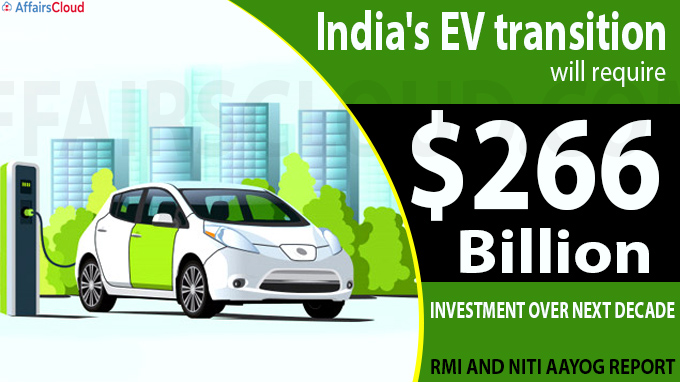 According to the report ‘Mobilising Finance for EVs in India: A Toolkit of Solutions to Mitigate Risks and Address Market Barriers, January 2021’ released by NITI Aayog & Rocky Mountain Institute (RMI), India’s transition towards Electric Vehicles (EVs) adoption between the years 2020-2030 will need a capital of INR 19.7 Lakh Crores (USD 266 Billion) they will be utilized for construction of vehicles, charging stations, and batteries & other infrastructures.
According to the report ‘Mobilising Finance for EVs in India: A Toolkit of Solutions to Mitigate Risks and Address Market Barriers, January 2021’ released by NITI Aayog & Rocky Mountain Institute (RMI), India’s transition towards Electric Vehicles (EVs) adoption between the years 2020-2030 will need a capital of INR 19.7 Lakh Crores (USD 266 Billion) they will be utilized for construction of vehicles, charging stations, and batteries & other infrastructures.
- Immediate steps needed to be taken for India’s EV transition are Mobilisation of Capital & Finance towards EV assets & infrastructure.
- Projected size of the Annual Loan Market for EVs will be around INR 3.7 lakh crore (USD 50 Billion) in 2030.
Main Purpose of the report – To provide Landscape assessment, Barrier Assessment & Solution Identification.
Key Findings:
i.India’s EV Transition is taking place at a rapid rate due to
- Demand Creation
- State EV Policies &
- Domestic Manufacturing
ii.Initiatives taken by Government to improve EV Sector in India
- Production-Linked Incentive (PLI) Scheme, with a budget of INR 18, 100 Crore (USD 2.4 Billion) for Advanced Chemistry Cell battery sector.
- To improve the Charging Infrastructure in India, Government has introduced the scheme ‘Faster Adoption and Manufacturing of Electric Vehicles (FAME)’ with a budget of INR 1, 000 Crore (USD 135 Million)
- Promoting the Domestic manufacturing of EVs through National Mission on Transformative Mobility and Battery Storage.
iii.Barriers towards EV adoption in India:
- Technology cost
- Policy Implementation
- Infrastructure availability
- Consumer behaviour
- Manufacturing and supply
- Capital amount needed for India’s transition is also a major hurdle
iv.The report listed 10 solutions that Financial Institutions (FIs), the EV sector, and government can adopt for mobilising capital needed for India’s EV Transition. It includes 6 targeted instruments & 4 ecosystem enablers.
6 Targeted Instruments are
- Inclusion of EVs in Priority Sector Lending (PSL) to increase lending. RBI mandates 40% of net bank credit to be used for deployment towards priority sectors.
- Interest Rate Subvention to improve the affordability of loans.
- Product guarantees and warranties – Reducing the uncertainties to improve their bankability.
- Risk-sharing mechanism (Government & multilateral led) for covering losses associated with financing EVs
- Risk-sharing mechanism (fleet operator-led): Fleet operators and final-mile delivery companies can leverage their existing FI relationships to provide partial credit guarantees and utilisation guarantees to driver-partners.
- Secondary Market Development – Industry-led buyback programmes & battery-repurposing schemes for improving the residual value of EVs.
4 Eco-system enablers:
- Digital Lending
- Business Model Innovation
- Fleet and aggregator electrification targets
- Open data repository for EVs.
Vehicle Financing:
i.As of 2020, the flow of finance from the organised sector (i.e., banks and non-banking financial companies (NBFCs)) is about:
• 50 percent to four-wheeler passenger vehicles (PVs)
• 40 percent to commercial vehicles (CVs)
• 10 percent to tractors and two-wheelers.
ii.Loan tenures for different segments are generally similar (about three to four years, except for two wheelers, which are shorter). Loan-to-value (LTV) ratios, i.e., the portion of asset value financed, vary—from 70 to 75 percent of the vehicle for two wheelers to 80 to 90 percent for CVs.
Click here to read the full report
Recent Related News:
i.The Andhra Pradesh (AP) Government has decided to set up 400 Electric Vehicle (EV) charging stations across the state to promote the usage of electric vehicles. The EV stations will be built under the first phase of the “Go Electric” Campaign.
About Rocky Mountain Institute (RMI):
Chief Executive Officer (CEO) – Jules Kortenhorst
Headquarters – Colorado, United States of America
About NITI Aayog:
Chief Executive Officer – Amitabh Kant
Headquarters – New Delhi




